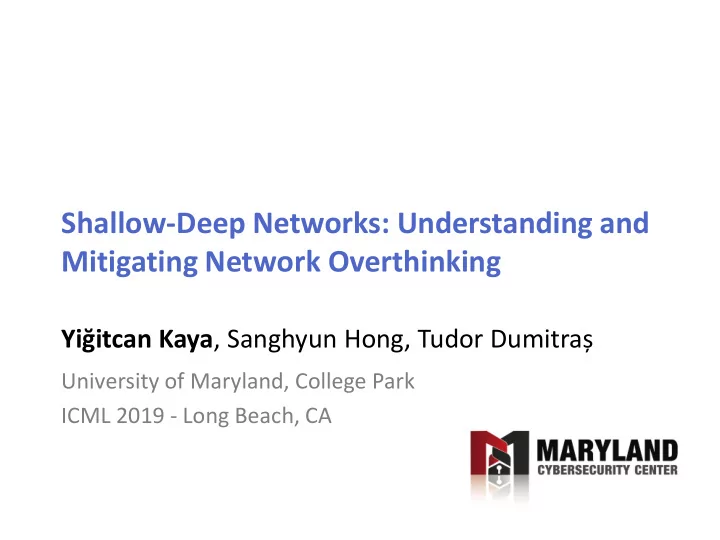

Shallow-Deep Networks: Understanding and Mitigating Network Overthinking Yiğitcan Kaya , Sanghyun Hong, Tudor Dumitraș University of Maryland, College Park ICML 2019 - Long Beach, CA
What is overthinking? We, especially grad students , often think more than needed to solve a problem. Shallow-Deep Networks: Understanding and Mitigating Network Overthinking
What is overthinking? We, especially grad students , often think more than needed to solve a problem. i. Wastes our valuable energy ( wasteful ) Shallow-Deep Networks: Understanding and Mitigating Network Overthinking
What is overthinking? We, especially grad students , often think more than needed to solve a problem. i. Wastes our valuable energy ( wasteful ) ii. Causes us to make mistakes ( destructive ) Shallow-Deep Networks: Understanding and Mitigating Network Overthinking
Do deep neural networks overthink too? Without requiring the full depth, DNNs can correctly classify the majority of samples. Experiments on four recent CNNs and three common image classification tasks Shallow-Deep Networks: Understanding and Mitigating Network Overthinking
Do deep neural networks overthink too? Without requiring the full depth, DNNs can correctly classify the majority of samples. i. Wastes computation for up to 95% of the samples ( wasteful ) Shallow-Deep Networks: Understanding and Mitigating Network Overthinking
Do deep neural networks overthink too? Without requiring the full depth, DNNs can correctly classify the majority of samples. i. Wastes computation for up to 95% of the samples ( wasteful ) ii. Occurs in ~50% of all misclassifications ( destructive ) Shallow-Deep Networks: Understanding and Mitigating Network Overthinking
How do we detect overthinking? Internal classifiers allow us to observe whether the DNN correctly classifies the sample at an earlier layer. Shallow-Deep Networks: Understanding and Mitigating Network Overthinking
How do we detect overthinking? Internal classifiers allow us to observe whether the DNN correctly classifies the sample at an earlier layer. ➢ Our generic Shallow-Deep Network (SDN) modification introduces internal classifiers to DNNs. Shallow-Deep Networks: Understanding and Mitigating Network Overthinking
The SDN modification Internal Layers Final Classifier Final conv1 conv2 conv3 conv4 full Input Prediction FR Original CNN Internal Classifier SDN modification full Internal Prediction Applied to VGG, ResNet, WideResNet and MobileNet. Shallow-Deep Networks: Understanding and Mitigating Network Overthinking
The SDN modification Challenge How to train accurate internal classifiers? Shallow-Deep Networks: Understanding and Mitigating Network Overthinking
The SDN modification Challenge How to train accurate internal classifiers? Prior Work Claims this hurts the accuracy in off-the-shelf DNNs Proposes a unique architecture [1] [1] Huang, Gao, et al. "Multi-scale dense convolutional networks for efficient prediction." ICLR 2018 Shallow-Deep Networks: Understanding and Mitigating Network Overthinking
The SDN modification Challenge How to train accurate internal classifiers? Results Our modification often improves the original accuracy by up to 10% . ( See our poster ) Shallow-Deep Networks: Understanding and Mitigating Network Overthinking
The wasteful effect of overthinking Horse ✔ conv1 conv2 conv3 conv4 full Input FR Wasteful for the correct classification full Horse ✔ Shallow-Deep Networks: Understanding and Mitigating Network Overthinking
The wasteful effect of overthinking Challenge How can we know where in the DNN to stop? Shallow-Deep Networks: Understanding and Mitigating Network Overthinking
The wasteful effect of overthinking Challenge How can we know where in the DNN to stop? Our Solution Classification confidence of the internal classifiers Shallow-Deep Networks: Understanding and Mitigating Network Overthinking
The wasteful effect of overthinking Our Solution Classification confidence of the internal classifiers Results A confidence-based early exit scheme reduces the average inference cost by up to 50% . ( See our poster ) Shallow-Deep Networks: Understanding and Mitigating Network Overthinking
The destructive effect of overthinking Dog X conv1 conv2 conv3 conv4 full Input Destructive for the FR correct classification full Horse ✔ Shallow-Deep Networks: Understanding and Mitigating Network Overthinking
The destructive effect causes disagreement Dog X conv1 conv2 conv3 conv4 full Input FR full Horse ✔ Shallow-Deep Networks: Understanding and Mitigating Network Overthinking
The destructive effect causes disagreement Challenge How can we quantify the internal disagreement? Our Solution The confusion metric Shallow-Deep Networks: Understanding and Mitigating Network Overthinking
The destructive effect causes disagreement Our Solution The confusion metric? Results Confusion indicates whether a misclassification is likely. Confusion is a reliable error indicator. ( See our poster ) Shallow-Deep Networks: Understanding and Mitigating Network Overthinking
The destructive effect causes disagreement Our Solution The confusion metric? Results Backdoor attacks [2] also increase the confusion of the victim DNN for malicious samples. ( See our poster ) [2] Gu, Tianyu, et al. "BadNets: Evaluating Backdooring Attacks on Deep Neural Networks." IEEE Access 7 (2019): 47230-47244. Shallow-Deep Networks: Understanding and Mitigating Network Overthinking
Implications • Eliminating overthinking would lead to a significant boost in accuracy and inference-time. • We need DNNs that can adjust their complexity based on the required feature complexity. Shallow-Deep Networks: Understanding and Mitigating Network Overthinking
For more details, visit our website http://shallowdeep.network Thank you! Don’t overthink! Come and see our poster! Pacific Ballroom – Poster #24 – 06:30-09:00 PM Shallow-Deep Networks: Understanding and Mitigating Network Overthinking
Recommend
More recommend